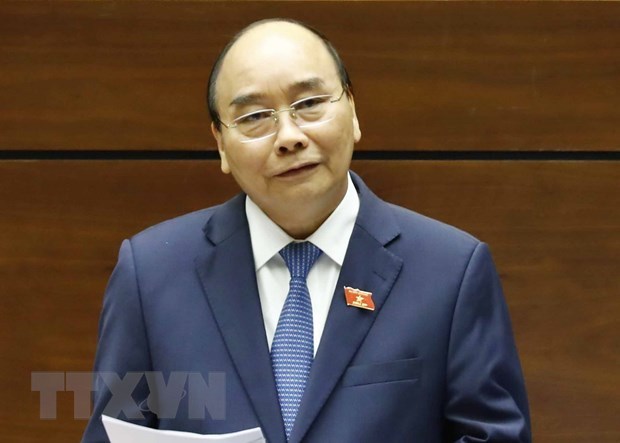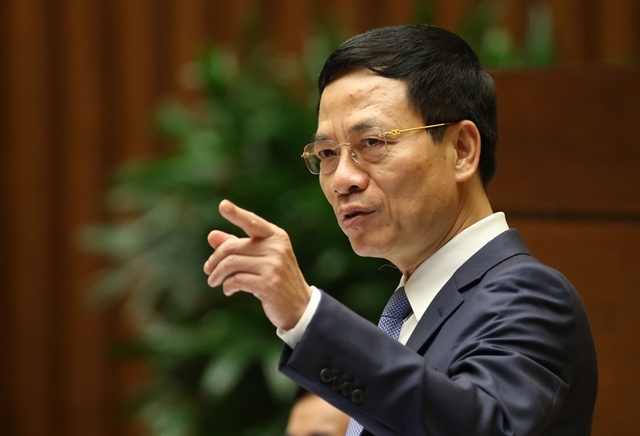 |
|
|
In his speech to the National Assembly (NA) on the last day of a series of cabinet hearings, Phúc reiterated the difficulties and hurdles on the way to Việt Nam becoming a developed, industrialised country by the middle of the century.
“Eradicating poverty is hard enough, but making the country prosperous and stable while closing the gap and catching up with other developed countries will be even harder,” he told the NA.
“The greatest challenge is not escaping the middle income trap but a lack of aspiration to go higher. The biggest threat is not (risks of) lagging economy but reluctance for actions for fear of responsibilities,” Phúc said.
Việt Nam’s key driving force for growth and development was no longer natural resources, he said, but the population of nearly 100 million Vietnamese people.
“Our political system is committed to take care of every single one so that none are left behind.”
‘Dangerous matter’
 |
|
Minister of Information and Communications Nguyen Manh Hung
|
Vietnamese-made social networks hope to have 90 million users by the end of 2020, the communications minister said on Friday.
Minister of Information and Communications Nguyễn Mạnh Hùng told the NA that the ambitious number – given that the country’s population was 96.2 million in 2019 – could be reached with “public support in preferring Vietnamese products”.
Hùng took the hot seat on Friday as the NA continued into its third day of cabinet hearings with deputies bombarding the minister with questions over issues including fake news, spam phone calls and the development of e-Government.
Responding to questions from HCM City deputy Tô Thị Bích Châu and Đồng Tháp deputy Nguyễn Thị Mai Hoa over the development of the Vietnamese digital ecosystem including social networks, Hùng said he set up a task force to support made-in-Việt Nam social networks as soon as he took office last year. His goal was to attract as many users as those of foreign platforms in Việt Nam – most notably, Facebook.
“After one year, Vietnamese social networks have gained growth of 30 per cent with some 65 million users,” the minister said.
Three new domestic social networks, namely Lotus, Gapo and Hahalolo, were introduced within months in 2019, joining in the race to attract users against other Vietnamese networks Zalo and Mocha as well as foreign players like Facebook and Google.
Those international platforms generated more or less 90 million users in Việt Nam a month, Hùng said.
The US social network Facebook had the biggest share of the pie with between 60 and 65 million active users monthly, according to the company.
“Now what we think, say, buy and even who we love, all can be found on social networks. It means that Vietnamese’ brains are staying in one place and it’s not in Việt Nam,” Hùng said.
“What will they (foreign networks) do with it? It’s a very dangerous matter, a matter of national security.”
The minister, however, said the Government did not aim to replace foreign social networks with domestic ones.
“Việt Nam has integrated and opened for investment. But to do business anyone in Việt Nam must abide by Vietnamese law and make Việt Nam more prosperous. Foreign social networks can exist alongside domestic ones if they follow Vietnamese law,” Hùng told the NA.
‘Fake news battle’
The Government’s push to switch netizens to domestic social networks is part of its efforts to tackle the fake news epidemic.
Minister Hùng cited an example saying that a task force of the communications detected and tried to remove 207 fake social media accounts and websites that spread disinformation over the last two months.
Of those impersonation cases, 46 were "involved with names of Party and Government leaders", he added.
Hùng said other countries had already made laws to address misinformation, for example Singapore where fake news spreaders are subject to fines of millions of dollars and jail terms.
“The Prime Minister has asked the Ministry of Public Security to co-ordinate with the Ministry of Information and Communications to soon issue legal regulations to battle fake news,” Hùng said.
He added that the communications ministry was working to find ways to identify users of social networks, and would require foreign social networks provide their users’ information upon request as regulated in the recently-adopted cybersecurity law.
The long-term solution to battle misinformation, however, should be education to raise awareness of citizens to learn how to distinguish between real and fake news, the minister said.
|
Never let such a tragedy happen again Prime Minister Nguyễn Xuân Phúc on Friday called for never letting the tragedy in which 39 Vietnamese people died inside a lorry in the UK repeat itself. “Our deepest sympathies go to Vietnamese citizens who were lost in the tragedy that occurred recently in the UK. We send our condolences to their families and relatives,” Phúc said in his opening remark before his hearing in the National Assembly on the country’s socio-economic development. “We shall never let that tragedy happen again,” the PM said. The Ministry of Public Security on Thursday night confirmed all 39 victims who were found dead in a lorry in Essex, the UK on October 23 were Vietnamese nationals. The news came following week-long co-operation between Vietnamese and UK police to identify the victims. — VNS |
 The greatest challenge to Vietnam's development was a lack of aspiration to move forward while the biggest threat was reluctance to take action due to fear of responsibilityNguyen Xuan Phuc yesterday.
The greatest challenge to Vietnam's development was a lack of aspiration to move forward while the biggest threat was reluctance to take action due to fear of responsibilityNguyen Xuan Phuc yesterday.